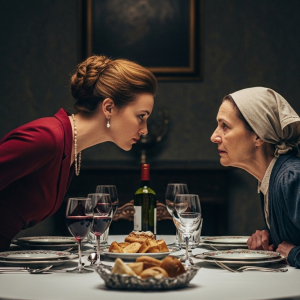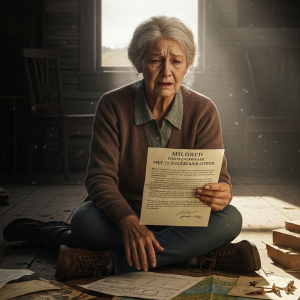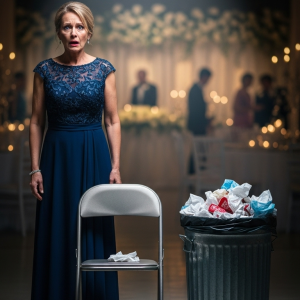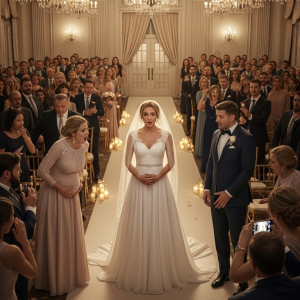I never thought that at seventy years old, I would find myself shrinking into the shadows of my own life. The day I buried William, my husband of forty-five years, was the day I discovered how little I was valued by the two people who should have cherished me most.
The funeral service was beautiful, if such a word can be used for something so somber. St. Mary’s was filled with people whose lives William had touched. He had been a kind, thoughtful man, a high school principal who was deeply respected in our community. I held myself together, accepting condolences with a quiet dignity, my hand held tightly by our son, Robert.
His wife, Diana, was there too, of course, elegant in black, her expression appropriately solemn. But after two hours of handshakes and hollow embraces, the weight of my grief became unbearable. I needed a moment alone. I slipped away to a small, empty side room, desperate for just five minutes of silence to finally let the tears flow.
William was gone. My partner, my anchor. After forty-five years, I was truly alone.
I don’t know how long I sat there before the door creaked open. I quickly wiped my eyes, not wanting to be seen in such a vulnerable state. But the newcomers didn’t notice me in my corner, partially hidden by a large floral arrangement. It was Robert and Diana.
“I told you we should have brought this up before he passed,” Diana’s voice hissed, stripped of the sympathetic tone she’d worn all day.
“It wasn’t the right time,” Robert replied, his voice heavy with exhaustion. “He was suffering enough.”
I froze, an unwilling eavesdropper. “Well, now we have to deal with her,” Diana continued, her voice sharp with irritation. “You need to talk to the lawyer first thing Monday. We need to know exactly what we’re getting, and how quickly.”
“Diana, please. My father isn’t even in the ground yet.”
“And your mother isn’t getting any younger,” she retorted. “The longer we wait, the more complicated it gets. We need to speed up the inheritance. I’m putting the old lady in a nursing home.”
The old lady? Me?
Robert sighed. “She’s not going to want to leave the house.”
“Of course not. But she can’t manage it alone, and you know it. It’s too big, there are stairs, and she’s already getting forgetful. It’s the sensible solution.”
“Maybe she could live with us,” Robert suggested, though his tone was uncertain.
Diana’s laugh was cold and sharp. “In our house? With my schedule? Besides, you know how she is, always in everyone’s business. I can’t have her there judging everything I do.”
“She’s my mother, Diana.”
“And you’re my husband. This is our life, our future. The money from selling that house could make a real difference for us. For the kids’ college funds.”
I sat perfectly still, my breath caught in my chest. William had been gone less than a week, and they were already dividing up our life, making decisions about my future without me.
They left, and I remained frozen, their words echoing in my head. The old woman. The house. The nursing home. When I finally stood, my legs trembled. I saw myself in a mirror on the wall—pale, aged, and diminished. Was this how they saw me? A burden to be managed? An obstacle to their inheritance?
Then I remembered something William had said, just days before he passed. He’d squeezed my hand, his eyes serious. “Eleanor, I’ve taken care of everything,” he’d whispered. “I’ve made sure you’ll be protected.”
At the time, I thought he was just comforting me. Now, I wondered if he had known exactly what was coming.
The house felt cavernous when I returned. For thirty years, its familiar walls had held our lives. Now, they echoed with absence. I couldn’t sleep, Diana’s words replaying in my mind like a cruel taunt. Had I spent my life nurturing children, both my own and others, only to be discarded when I was no longer useful?
The next morning, a cheerful knock announced Diana’s arrival. She stood on my porch holding a casserole dish, a bright, false smile plastered on her face. “Eleanor! I brought you some chicken pot pie. I know how hard it is to cook for just one.”
I forced a smile and invited her in. She swept into my kitchen and immediately began opening cabinets as if she owned the place. “Let me help you organize a bit. This kitchen is just so… cluttered.” She started rearranging my spice rack, the one William had built for me as an anniversary gift.
“I’ve managed my kitchen just fine for thirty years,” I said, my voice sharper than I intended.
Her sympathetic mask slid back into place. “Of course, you have. I just thought I’d help make things easier… now.” She gestured vaguely at the empty chair where William used to sit.
“Now that I’m alone and apparently incapable?” The words slipped out before I could stop them.
Her eyes widened. “Eleanor, no one thinks that. We’re just concerned about you in this big house all by yourself.”
“Robert and I have been talking,” she continued, her voice gentle but firm. “We think it might be time to consider some options.” She was already pulling glossy brochures from her purse. “Senior living communities. There’s a lovely one just twenty minutes from us.”
“I’m not ready to leave my home, Diana,” I said, my voice steady.
“No one’s saying right this minute,” she backpedaled. “But it’s good to start planning ahead.”
The funeral was barely over. To change the subject, I said, “I found something interesting in William’s desk calendar. He had several appointments with Mr. Goldstein in the weeks before he passed.” Mr. Goldstein was our lawyer.
Diana’s smile faltered. “Oh. Probably just updating his will. Standard procedure.”
“Probably,” I agreed. “When is the reading scheduled?”
“Robert’s handling that. I think it’s next week.” She stood abruptly and left, leaving the brochures for smiling seniors on my kitchen table. None of it was my home.
That afternoon, I called Dr. Patterson, William’s doctor and our friend. “Eleanor, how are you holding up?”
“I’m managing. I’m calling about William. In those last few weeks, did he ever talk to you about… his concerns for me?”
There was a careful pause. “He did. He asked me to be available if you needed a medical opinion about your capacity to live independently. He was concerned there might be pressure for you to leave your home before it was medically necessary.”
Relief washed over me. “It’s already been suggested.”
His tone sharpened. “That seems premature. You’re in excellent health, Eleanor. There is no medical reason you can’t continue living in your home. In fact, William asked me to prepare a letter stating just that. I have it ready. He thought you might need it.”
My William. Even in his final days, he was anticipating the battle ahead. My tears were no longer just of sorrow, but of gratitude. And resolve. I would not be pushed aside so easily.
The next morning, Robert and Diana arrived, their faces set with a determined cheerfulness that put me on high alert. I had already brewed coffee, ready to face them. William always said preparation was half the battle.
“Mom, we wanted to talk about some practical matters,” Robert began.
“Of course,” I said. “I’ve been thinking about practical matters, too.”
Diana immediately produced more brochures. “This one has a waiting list, so it’s good to get on it early.”
“Before we discuss that,” I said calmly, “I’d like to ask Sandra to join us.”
Diana’s eyebrows shot up. “Sandra? The nurse who helped with Dad?” As if on cue, the doorbell rang. Sandra Peterson, William’s no-nonsense home health nurse, stepped inside.
“Eleanor, we were hoping for a family discussion,” Diana said, her eyes narrowing.
“Sandra was practically family these last few months,” I replied smoothly. “And her professional experience will be helpful.”
With Sandra beside me, my courage grew. “Robert, Diana, I appreciate your concern, but I’ve decided to stay in my home.”
“Eleanor, we understand this is emotional,” Diana began, “but practically speaking—”
“Practically speaking,” I interrupted gently, “I am perfectly capable of living independently. I’ve spoken with Dr. Patterson, who agrees. He’s provided a written statement.” I passed Robert the letter. His eyes widened as he read it.
“This says you’re in excellent health for your age,” he said, sounding genuinely surprised. Had they already convinced themselves I was frail and failing?
“I also spoke with social services,” Sandra added. “They can assess what supports Eleanor might need to stay home safely.”
“Actually,” I said, looking Diana straight in the eye, “It seems you’ve already decided I should move. ‘Putting the old lady in a nursing home’ were your exact words, I believe.”
The room fell silent. Diana’s face went from pale to flushed. “I don’t know what you think you heard—”
“I heard you at the funeral, Diana,” I said quietly. “In the side room. I was sitting in the corner.”
Robert’s face fell. “Mom, I…”
The doorbell rang again. This time it was Emma, my sixteen-year-old granddaughter, letting herself in. “Hi, Grandma! Oh. Sorry, am I interrupting?”
“Not at all, sweetheart,” I said.
Emma, thoughtful and perceptive like her grandfather, glanced around the tense room. “Is everything okay?”
“Your parents think I might be better off in a senior living community,” I explained.
“What? Why?” Emma looked shocked. “Grandma’s fine! She literally taught me how to make lasagna from scratch last weekend. You’re not incapable just because you’re seventy.”
I felt a rush of love for my fierce granddaughter. Looking at her determined face, I knew I wasn’t entirely alone in this battle.
The lawyer’s office was tense. Diana checked her watch every few minutes, while Robert flipped through a magazine, his anxiety palpable. My own heart pounded against my ribs.
Mr. Goldstein, dignified and kind, led us into his conference room. “Before we begin,” he said, “I want to express my condolences, Eleanor. William was a good man.”
He adjusted his glasses. “William’s will is fairly straightforward. Eleanor, as his surviving spouse, you inherit the house outright, the joint accounts, and the life insurance policy.”
“And the investment accounts?” Diana cut in.
Mr. Goldstein gave her a neutral glance. “The retirement account, worth approximately $450,000, names Eleanor as the primary beneficiary.” He paused, turning a page. “There is, however, a clause that William added three months ago. It concerns the house specifically.”
This was it.
“The house is bequeathed to Eleanor Bradley with a lifetime right of residence,” he read. “Upon her death, it will pass to Robert Bradley. However… there is a condition.”
He looked up at us over his spectacles. “If Eleanor is forced or pressured to leave her home against her wishes, or without the documented recommendation of two independent medical professionals, the house will not pass to Robert. Instead, it will be sold, and the proceeds will be donated to the Alzheimer’s Research Foundation.”
The room was utterly silent. William had built me a fortress of legal protection.
Robert looked stunned. “I don’t understand. Why would Dad think Mom would be forced to leave?”
Diana’s face had drained of all color. “This is ridiculous,” she whispered, her voice tight with fury.
“I am simply conveying the terms of the will,” Mr. Goldstein said calmly. “William also established a trust to pay for home maintenance and any in-home care services Eleanor might require. He was of sound mind when he made these changes, and we videotaped the signing to prevent any challenge.”
He then handed me an envelope. “William left a personal letter for each of you,” he said, passing one to Robert as well.
“There’s nothing for me?” Diana asked, her indignation spilling over.
“I’m afraid not, Mrs. Bradley.”
Back home, with a cup of tea, I opened my letter.
My darling Eleanor, it began in his familiar script. If you’re reading this, I’m gone and you’re facing the challenges I feared. I’ve done what I can to protect you. The house is yours for as long as you want it. Don’t let them rush you. You’re stronger than you know. All my love, now and always, William.
Tears streamed down my face, but they were tears of profound, unending love. Even from beyond, my husband was fighting for me.
When Emma arrived that afternoon, her expression was serious. “Grandma, we need to talk. Mom and Dad are fighting about the will. What’s really going on?”
I told her everything. Her face darkened with understanding. “The house. They want to sell it, don’t they? Good for Grandpa,” she said fiercely. Then she made a surprising offer. “You know, I could move in with you. I’m starting at State next year. I could live here instead of the dorms, and Mom couldn’t argue that you’re all alone.”
Before I could respond, Diana and Robert walked in. An argument was already brewing when Emma, from her post on the stairs, dropped a bombshell.
“They’re arguing about whether Grandma should be forced into a nursing home so you guys can sell her house.”
The kitchen fell silent.
“Don’t lie, Mom,” Emma continued, her voice ringing with conviction. “I heard you on the phone with that real estate agent yesterday. You said the house could go on the market by summer if you ‘played your cards right.’”
Robert’s face went white. “Diana, is that true?”
I had never seen my son look at his wife with such raw disappointment. “I think,” I said quietly, “we all need to have an honest conversation. No more schemes. No more whispers. Just the truth.”
We sat at the kitchen table. It was a tense family court, with Emma as my staunchest defender.
“Grandma is perfectly capable of living here,” she argued. “You just want the money from selling the house!”
“And when exactly was I supposed to bring it up?” Diana demanded of Robert. “When she’s ninety? After she falls down those stairs?”
“Stop it,” I said, my voice firm. “I am sitting right here. Do not talk about me as if I’m not in the room.”
The confrontation stretched on, but something had shifted. William’s will had given me power, and Emma’s loyalty had given me voice. It was Robert who finally broke the stalemate.
“I’m sorry, Mom,” he said, turning to me. “Dad was right. I didn’t see what was happening. This isn’t right.” He looked at Diana. “How would you feel if someone decided your life choices weren’t valid anymore? If they planned to send you away?”
Defeated for now, Diana relented. Emma’s offer to move in was the final checkmate, a practical solution that Diana couldn’t argue against. The immediate battle was over.
The months that followed brought a quiet revolution. Grab bars were installed, and a medical alert system was activated. That fall, Emma moved into the guest room, filling the house with the vibrant energy of youth.
Robert began visiting more often, sometimes alone. We sat on the porch swing William had hung, and he talked about his life, his marriage, and the kind of man his father’s letter had inspired him to be. The power dynamic in his relationship with Diana had changed. When she brought up the house again, he shut her down. “Mom stays where she wants to stay. End of discussion.”
I discovered that seventy was not an end, but a new beginning. I joined a water aerobics class, reconnected with old friends, and volunteered at the library. The grief for William never disappeared, but it softened, making space for a new life to grow around it.
On the anniversary of his death, I stood at his grave. “You were right,” I whispered to the cool stone. “I bent, but I didn’t break.”
That night, Emma and I ate dinner on the patio. Fireflies blinked in the twilight as she talked about her first year of college.
“Do you ever regret turning down the dorms?” I asked.
She smiled. “Never. This was right for both of us.” She winked. “Plus, it drives Mom crazy, which is a bonus.”
I laughed, a full, rich sound that filled the evening air. William would have loved hearing it. I knew Diana hadn’t given up, that she was merely regrouping. But I was no longer afraid. I had found my voice, my strength, and my dignity. I was Eleanor Bradley, seventy-one years old, living in my own home, on my own terms. And I wasn’t going anywhere.




